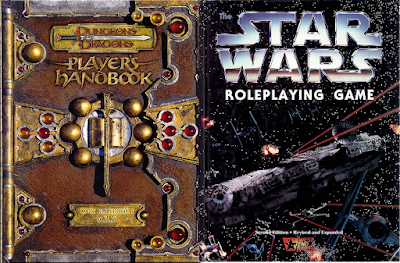My wife Debra is my favorite gamer. Obvious and unapologetic bias aside, she makes the best characters. Once she grasped the rules for multi-classing in D&D 3rd edition (much faster than I did) she never created the same kind of character twice. She had one, a Bard/Rogue/Fighter/One-of-the-exotic-Prestige-Classes that looked like a half-elf David Bowie and I remember them fondly.
 |
| Half-elf is almost redundant. |
But they were all fun. Debra played Changelings, Shaman, Classes and Races from obscure 3rd parties books and a few home-brew Races and Classes as well.
I've mentioned before that one of the reasons I didn't enjoy playing 4th edition D&D was the difficulty in making multi-class or home-brew content. I felt like we couldn't make the game our own. With 3rd edition the issues were different:
- It was hell to prep for. Every monster and NPC used the Player Character format and that format was neither simple nor short. The stat blocks in the Monster Manual were difficult to use at the table on the fly.
- Experience. The XP rules - actually, I don't think I ever used the XP rules. I just let everyone level up after each session.
- NPC Spellcasters. Remember NPCs used PCs format? So I'd need the MM and DMG and the Player's Handbook unless I wanted to write out every spell discription.
IMPLICIT RESTRICTIONS
These were the obvious issues. The more insidious issues, the ones I had to have pointed out to me, are the issues implicit in the design. Skill lists for example.
Without spending the remainder of this post breaking down the rules for getting skills, increasing skills and using skills, let us focus instead on the affects of having a skill list at all:
- A skill list implies that there is a finite number of possible actions. If as a player you've ever looked at your sheet to see what you can do, you know what I mean. If the system has more skills that favor a certain kind of play (like combat) or forces Players to spend a limited number of points on specific skills to make the character viable, then that is what the game is about. How you Play is What you Win.
- A skill list implies that you must roll for any action in which there is a skill. Ever play a modern/near-future campaign and fail a Drive check going to your apartment?
- A skill list implies your character concepts are limited. This is really bad in systems that have Class-based character builds, with limited lists of skills one can gain without penalty, but it's also present in any system with skill lists. One of the reasons I'm making Project NEPTUNE is because it's impossible to make a character that's viable in both regular and space combat. The available skill points are spread too thinly.
This last point is a particular peeve because it opens up the Munchkin-Min/Max-Can-Of-Worms that is Character Build Optimization. I personally am not interested in gaming the rules for advantage when rolling dice. I do not want to make a game that rewards or, if possible, allows that sort of meta-gaming.
I'm Diabetic - I already can't eat without doing complex math.
Skill Chapters are 26 and 30 pages respectively.
SKILL ROLLS WITHOUT SKILL LISTS?
Years ago now, I read a post from Tales to Astound that has stuck with me ever since. The TL;DR version is that during a con-game, the author wrote the character generation rules out on-the-fly and included a game gem so lustrous it's stuck with me ever since:
That. Right. There. Your character can do all the things that profession can do.
That simple sentence implies so much more freedom than the most comprehensive chapter on skills is able to. Let's unpack it a bit:
- The less you define a skill list, the more potential a Character has. Say your profession is Butcher. This immediately conjures up images of someone who is strong and good with knives. I'd easily believe they are intimidating as well. But there's so much more - Butchers are business people! They would know about taxes, sales, bookkeeping, and (depending on your setting) how to Drive.
- You don't have to roll for every action. It's baked in - your Character can do these things. There's no risk of failure unless there's a special circumstance.
- An undefined skill list allows for creative interpretation. You can make a case a Butcher would know how to stitch someone up. They work with knives all the time, may not have money for the village barber or may lack health insurance - A case can be made that the particular Butcher you are playing can stitch up a wound. And if a fellow PC is bleeding out you'd make that case. Likewise, you could make the case a Butcher that works with the public daily would know how to flirt. The GM may not agree with either case but the implication of the system is you have permission to try a creative interpretation of your Character.


One of my favorite RPG systems explicitly states that its skill list is 'non-exhaustive' and varies by setting - if you think your character is best represented by the skill "Journalism," then go for it. (That example is in the text.)
ReplyDeleteOn the other hand it also has sub-skills, which go the opposite way; Scrounge seems nice, broad, and clear, but you're *supposed* to use it as Scrounge (Something), which could mean anything from Scrounge (Foraging), the obvious, to Scrounge (Internet), which is arguably mis-named.
Which system, if I may ask? I've also played in system with granular skill lists - Your above examples remind me a bit of WEG D6. My players would often times run into the issue of not having enough points to go around.
DeleteEABA, 'End-All-Be-All' by BTRC. It's a nifty dicepool system built around logarithmic curves. No dice roll has more than +2; if you add your modifiers to get a +3 that's +1d6 instead, but in most casss you take the three highest dice from the roll, so a roll of 20 is peak human performance.
DeleteI have never got a campaign to run more than one session, but that's on me.